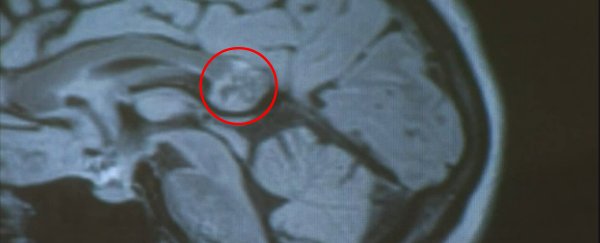A 26-year-old woman went in to have what she assumed to be a brain tumour removed… but surgeons actually pulled out what they believe to be an undeveloped embryonic twin, complete with hair, teeth and bone.
Indiana University PhD student Yamini Karanam first went to see doctors when she started getting bad headaches and struggling with reading- and listening- comprehension, and they quickly spotted a rapidly growing pea-sized tumour on her pineal gland. But they've now discovered the mass was actually a 'teratoma' - a mysterious type of tumour that contains its own tissue and even organs.
Although scientists still aren't entirely sure what causes these tumours, one of the leading theories is that teratomas were originally embryonic twins that never developed, and ended up being absorbed into the surviving twin's body instead. Karanam is now lightheartedly calling the tumour her "evil twin sister who's been torturing her for the past 26 years," as NBC News reports. And we're kind of glad someone else said it first, because this is pretty horror movie-esque stuff.
To help her remove the tumour, Karanam sought out neurosurgeon Hrayr Shahinian, who has pioneered a keyhole brain surgery technique for removing tumours deep in the brain. After making a cut of just over one centimetre, Shahinian used an endoscope and fibre-optic technology to reach in and gently "chisel away" at the tumour, as Shahinian told NBC News.
Teratomas are rare, especially in the brain. "This is my second one, and I've probably taken out 7,000 or 8,000 brain tumours," said Shahinian.
However, they seem to be more common in other parts of the body. In 2009, a man named Gavin Hyatt in the UK "gave birth" to his own identical twin - a tumourous ball of tissue that pushed its way out of his abdomen. He went on to keep it in a jar, and has named it "little Gav". And just last year, scientists found parasitic twins in the abdomen of a newborn baby.
Doctors have now determined that Karanam's teranoma wasn't cancerous, and she's expected to make a full recovery within roughly three weeks - she's blogged about her experience over at 'The 'n' Phases of her Tumor'. We love people who have a sense of humour when it comes to the gorier side of medical science - fingers crossed she has a speedy recovery.
